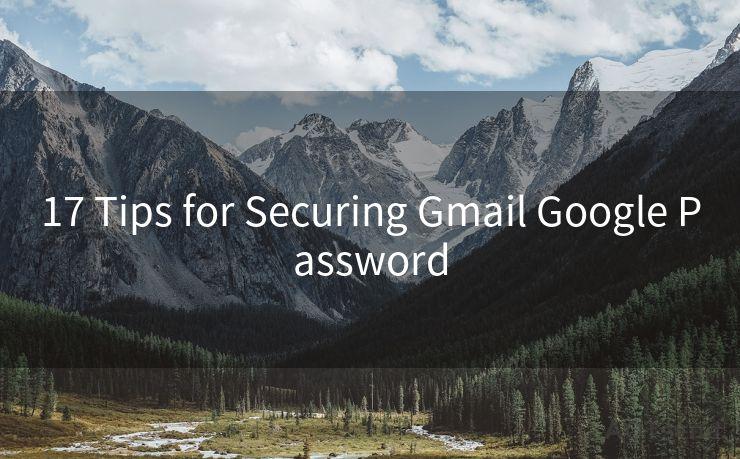17 Tips for Securing Gmail Google Password




In today's digital age, protecting your online accounts, especially your Gmail and Google account, is crucial. Your Gmail account is often the gateway to many other online services, making it a prime target for hackers. Here are 17 tips to help you secure your Gmail and Google password.
1. Use a Strong Password
Creating a strong and unique password is the first step in securing your Gmail account. Avoid using easily guessable information like your name, birthdate, or common words. Instead, opt for a complex combination of letters, numbers, and symbols.
2. Enable Two-Factor Authentication
Two-factor authentication adds another layer of security to your account. When enabled, you'll need to provide an additional code, sent to your phone, in addition to your password when logging in.
3. Update Your Recovery Information
Make sure your recovery email and phone number are up to date. These are crucial for account recovery if you forget your password or if your account is hacked.
4. Regularly Review Account Activity
Periodically check your Gmail account's activity log to spot any unusual or unauthorized access attempts.
5. Be Wary of Phishing Attacks
Phishing emails are designed to trick you into revealing your personal information. Never click on suspicious links or provide sensitive information via email.
6. Use a Secure Connection
Always access your Gmail account over a secure HTTPS connection. This ensures that your data is encrypted while in transit.
7. Avoid Public Computers
If possible, avoid accessing your Gmail account on public computers. These machines may be infected with malware that can steal your login credentials.

8. Keep Your Software Updated
Regularly update your browser and operating system to ensure you have the latest security patches.
9. Don't Share Your Account Information
Never share your Gmail login credentials with anyone, even if they claim to need access for a legitimate reason.
10. Use a Password Manager
Consider using a password manager to generate and store complex passwords. This way, you won't have to remember them all.
11. Be Mindful of Extensions and Plugins
Be cautious when installing browser extensions or plugins, as some may pose a security risk.
12. Monitor Your Connected Apps
Regularly review the apps and services that have access to your Gmail account. Revoke access for any that you no longer use or don't trust.
13. Back Up Your Data
Periodically back up your important emails and data. This ensures that you won't lose valuable information in case of an account breach.
14. Educate Yourself on Security Threats
Stay informed about the latest online security threats and how to protect yourself from them.
15. Use a VPN for Public Networks
When accessing your Gmail account on public Wi-Fi, use a VPN to encrypt your connection and protect your data.
16. Avoid Auto-Login Features
While convenient, auto-login features can pose a security risk if your device is lost or stolen. Disable these features for added security.
🔔🔔🔔
【AOTsend Email API】:AOTsend is a Managed Email Service for sending transactional emails. Support Email Types: reminders, authentication, confirmations, notifications, verification codes, invoices, password resets, account activations, billing statements, two-factor authentication (2FA), and one-time passwords (OTP) emails, etc. $0.28 per 1000 Emails. 99% Delivery, 98% Inbox Rate.
You might be interested in:
Why did we start the AOTsend project, Brand Story?
What is a Managed Email API, How it Works?
Best 25+ Email Marketing Platforms (Authority,Keywords&Traffic Comparison)
Best 24+ Email Marketing Service (Price, Pros&Cons Comparison)
Email APIs vs SMTP: How they Works, Any Difference?
17. Contact Google If You Suspect a Breach
If you suspect that your Gmail account has been hacked or breached, immediately contact Google support for assistance.
By following these 17 tips, you can significantly enhance the security of your Gmail and Google account, protecting your personal information and preventing unauthorized access. Remember, security is an ongoing process, so stay vigilant and adapt your practices as new threats emerge.




Scan the QR code to access on your mobile device.
Copyright notice: This article is published by AotSend. Reproduction requires attribution.
Article Link:https://www.mailwot.com/p377.html



